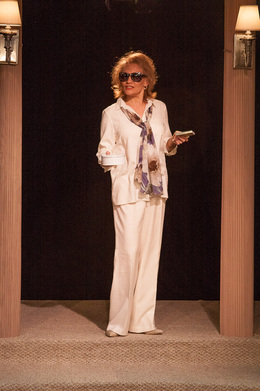
This is a play about "divergent truths" (that's from the play). About how our perceptions of reality diverge according to when, where and with whom we exist in the world. "Truth" is generational, it's cultural and it's personal. And, of course, with divergent truth comes conflict! That's where the play begins.
Do you have trouble keeping secrets?
Ha! That depends. I'm very good at keeping secrets that I know are supposed to be kept. In other words, if you tell me something you don't want me to tell anyone else, you'd better tell me that too.
I like to think I'm one of Malcolm Gladwell's "connectors" (from The Tipping Point), and that when I share information, it's just my effort to encourage connections between folks who might not otherwise find commonalities. Here's where "divergent truths" come into play. Some people see it as telling tales out of school. Go figure.
What character do you play and how does she fit into the story?
I play Polly. She's the mom. Or, more precisely, the Matriarch. Polly is smart, strong, and in control--she's had to be--but she sometimes forgets to be kind. That's an understatement. 'Nuff said.
What's your favorite line in the play?
This is a well written play, and there are many great lines, but I don't think I've identified a favorite. I love a lot of what Trip says. He's the son, the youngest child (which I am too, by the way) and the truth teller. He kind of nails everybody.
Ok, here's a good one, in response to his sister suggesting he just doesn't understand her depression:
"How do you know what I have and don't have?... You have your head so far up your own butt, you wouldn't notice if I were covered in killer ants and being stung to death right in front of you." It sounds harsh, but it's said with love, believe it or not. That's Trip, he loves everybody, warts and all.
Can you relate to the family dynamics in the play?
I am blessed with a very loving, well functioning family, with mostly shared political and social views. Lucky me. That said, I can certainly identify with generational differences. Even though I'm at the opposite end of the spectrum, politically, Polly's ideas about happiness are spot on. Polly and Lyman are from the generation whose happiness is a product of health, productivity and self-sufficiency. She has no patience for what she sees as a generation of children who want to place responsibility and blame externally, often on parents. I have to admit, I also have no patience for adults who can't get beyond blaming their parents. Psychoanalyze, fine, but then move on. That's the Polly in me.



